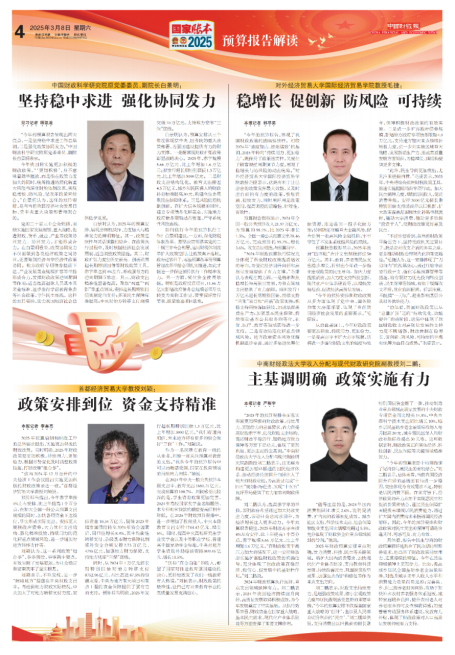Recently, Liu Erpeng, a researcher at the Center for International Cooperation and Disciplinary Innovation of Income Distribution and Public Finance (111 Center), accepted an exclusive interview with China Financial and Economic News, interpreting the popular topics of the Two Sessions from a professional perspective. The following is the full text of the report.

"The budget arrangement for 2025 fully implements the overall requirements of implementing a more proactive fiscal policy and making continuous and greater efforts. It focuses on increasing the fiscal deficit ratio, optimizing the fiscal expenditure structure, promoting stable fiscal operations, and strengthening local financial support. It reflects the main tone of being more positive and proactive." According to Liu Erpeng, a researcher at the 111 Center of Zhongnan University of Economics and Law, this undoubtedly injects strong fiscal momentum into building a more smoothly circulating national economic system and driving sustained economic recovery. It also provides robust and effective fiscal support for the high-quality completion of the 14th Five-Year Plan objectives and a good start to the 15th Five-Year Plan.
Liu Erpeng believes that the move to increase the deficit ratio indicates that the government hopes to drive a recovery in total social demand and inject greater impetus into economic growth by enhancing fiscal expenditure. This year's budget report proposes that the fiscal deficit ratio in 2025 is arranged at around 4%, an increase of 1 percentage point over the previous year. The deficit scale is RMB 5.66 trillion, growing by RMB 1.6 trillion year on year. "Given the increasing pressure on fiscal balance, this arrangement sends a clear signal of implementing expansionary fiscal policy, which fully reflects the fundamental role of fiscal policy in stabilizing the economy, boosting confidence, and facilitating development", said Liu Erpeng.
The 2024 fiscal budget was well implemented, with strong support for key spending areas. Liu Erpeng said that China's economy continued to pick up in 2024, and high-quality development achieved positive results, laying a solid foundation for this year's development. Regarding implementation effects, fiscal funds played a significant supporting role in major national strategies, basic people's livelihood needs, and the development of a modern industrial system.
"Notably, the domestic consumption tax increased by 2.6% year on year in 2024, indicating the initial effects of policies to boost consumption and expand domestic demand. Urban and rural community spending, science and technology spending, and social security and employment spending all saw year-on-year growth of over 5.5%, fully reflecting the orientation of fiscal funds to key areas", said Liu Erpeng.
The 2025 fiscal budget arrangement has clear priorities, focusing on key areas such as consumption, science and technology, and people's livelihood. The key directions for expenditure include expanding domestic consumer demand, accelerating the development of a modern industrial system, supporting the development of education and technology, continuously improving people's livelihood, consolidating the results of poverty alleviation, and reinforcing ecological protection and restoration.
Liu Erpeng said that the continued efforts in fiscal expenditure embody a crucial measure to enhance policy effects and narrow the gap between macroeconomic policy strength and residents' micro-perceptions. "This year's budget arrangement not only covers the 'national economy' of major national strategies but also involves the 'people's livelihood' of vital interests to the people." Liu Erpeng gave an example, saying that the ultra-long-term special government bond funds supporting consumer goods trade-ins have doubled, the central government's special funds for promoting high-quality development in key manufacturing areas have increased by 14.5% year on year, and the central government's science and technology expenditure has achieved 10% year-on-year growth. Additionally, the minimum standard of the basic pension for urban and rural residents has been raised by RMB 20 per person per month, and the per capita fiscal subsidy standard for urban and rural residents' medical insurance has increased by RMB 30. According to the data, fiscal policy is making targeted efforts in key areas such as the real economy, scientific and technological innovation, and people's livelihood guarantee.
"This year's budget report particularly emphasizes the organic combination of boosting consumption and benefiting people's livelihood." Liu Erpeng stated that overall, the foundation for China's current economic recovery needs to be further consolidated, which is highlighted by insufficient effective demand, especially sluggish household consumption. In this context, economic policies focus on closely combining efforts to benefit people's livelihood and boost consumption. The aim is to enhance residents' consumption capacity by expanding the scope and improving the quality of people's livelihood guarantee and smooth the circulation of the national economy by expanding domestic consumer demand. Therefore, this year's budget arrangement and fiscal policy can guarantee people's livelihood expenditure at the right time in a perceptible, accessible, vigorous, and effective way.
Specifically, the people's livelihood-oriented fiscal budget in the report appropriately aligns with the expectations of the people and situational requirements while highlighting the continuity and coherence of fiscal policy. This year, the guarantee of people's livelihood is strengthened. For example, raising the minimum standard of the national basic pension for urban and rural residents delivers obvious effects in enhancing the income level and consumption capacity of the elderly in urban and rural areas. Refining the elderly care service network at the county, township, and village levels can accelerate efforts to shore up weak links in the rural elderly care service system, reduce the burden of family support, and improve the accessibility and sense of gain of rural elderly people to elderly care services. Furthermore, strengthening the development of the universal childcare service system and issuing childcare subsidies can reflect the strong support of fiscal policy for high-quality population development.
Electronic Version of China Financial and Economic News (click the link to skip): http://114.118.9.73/epaper/
